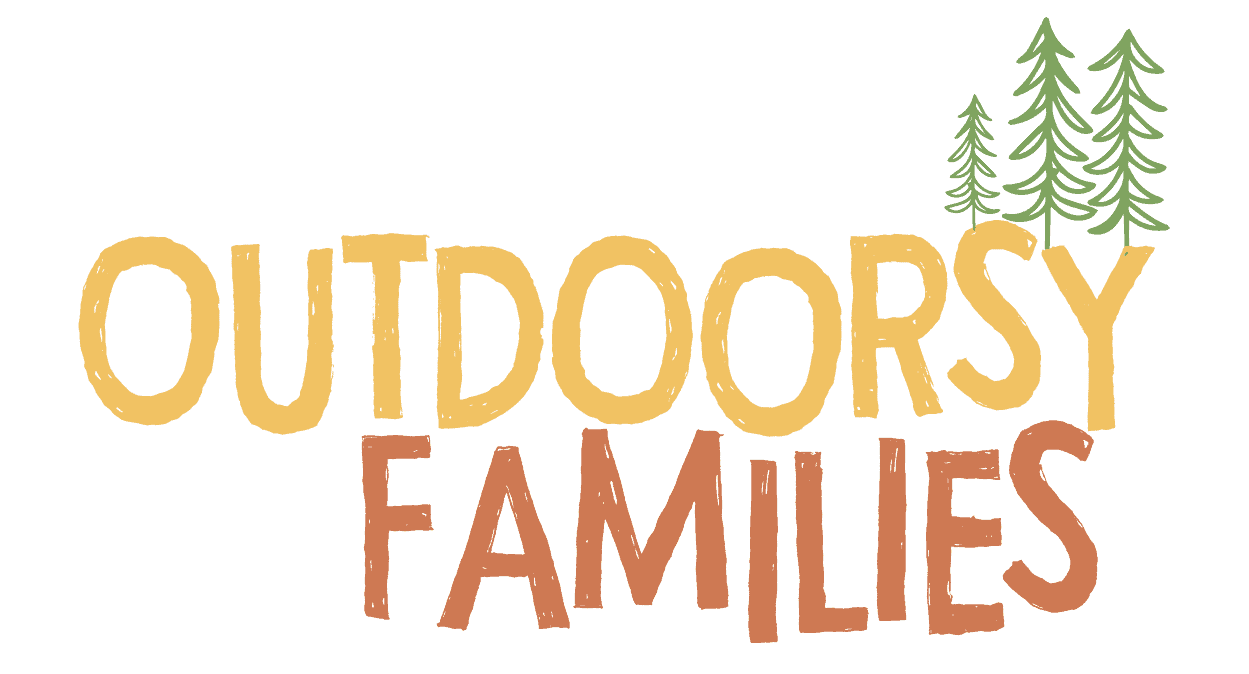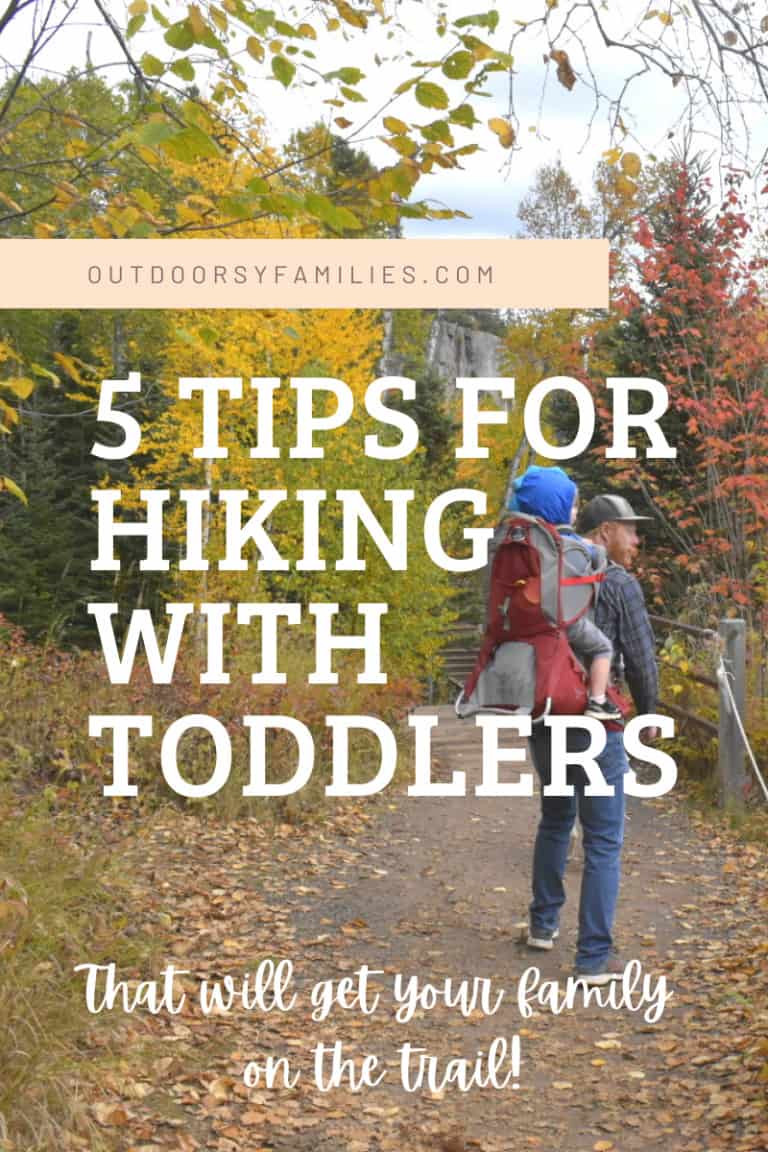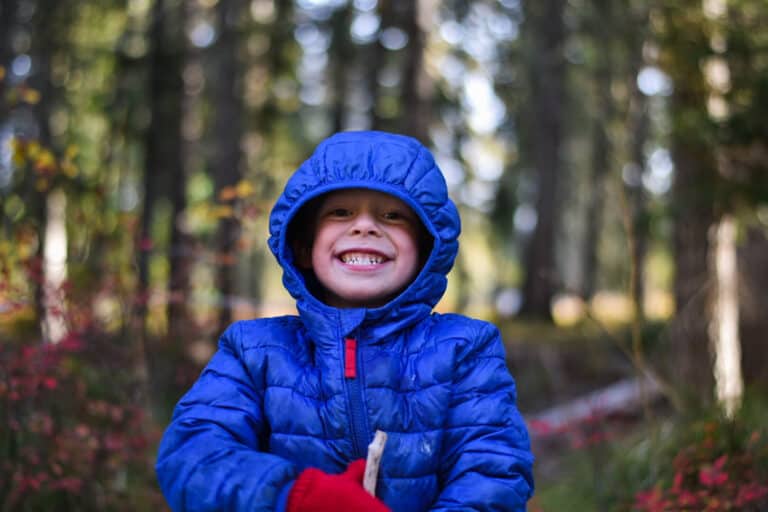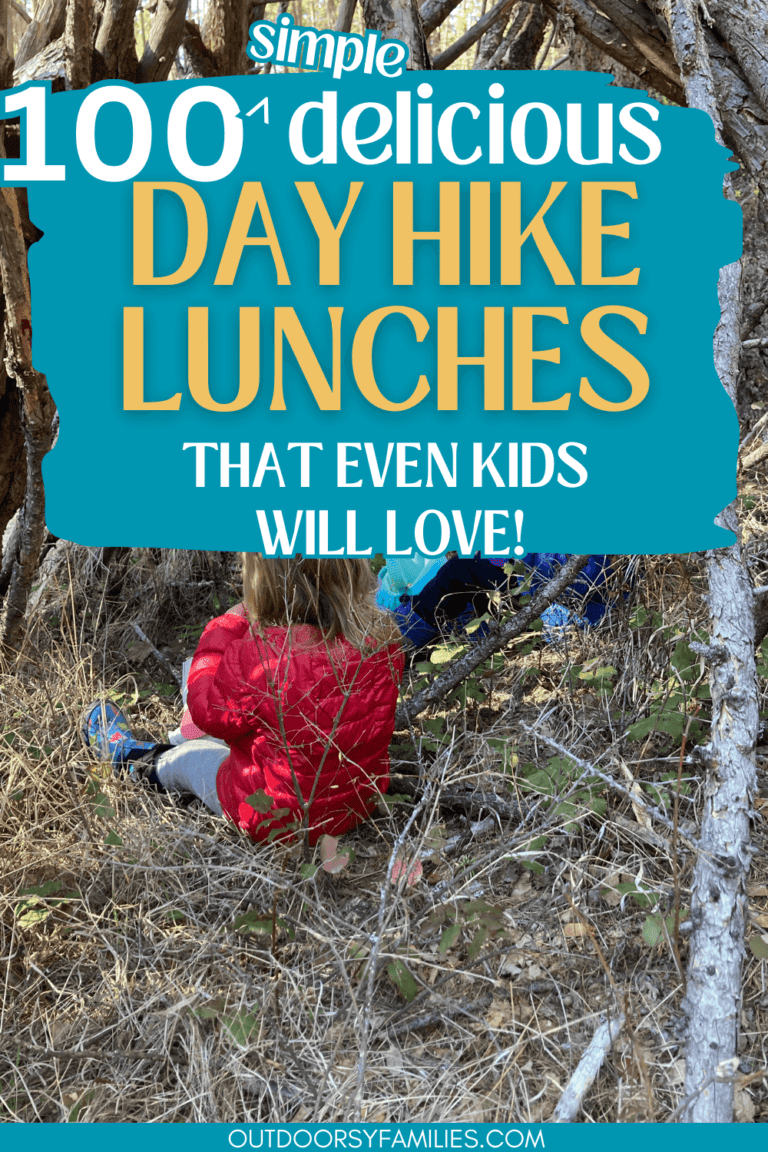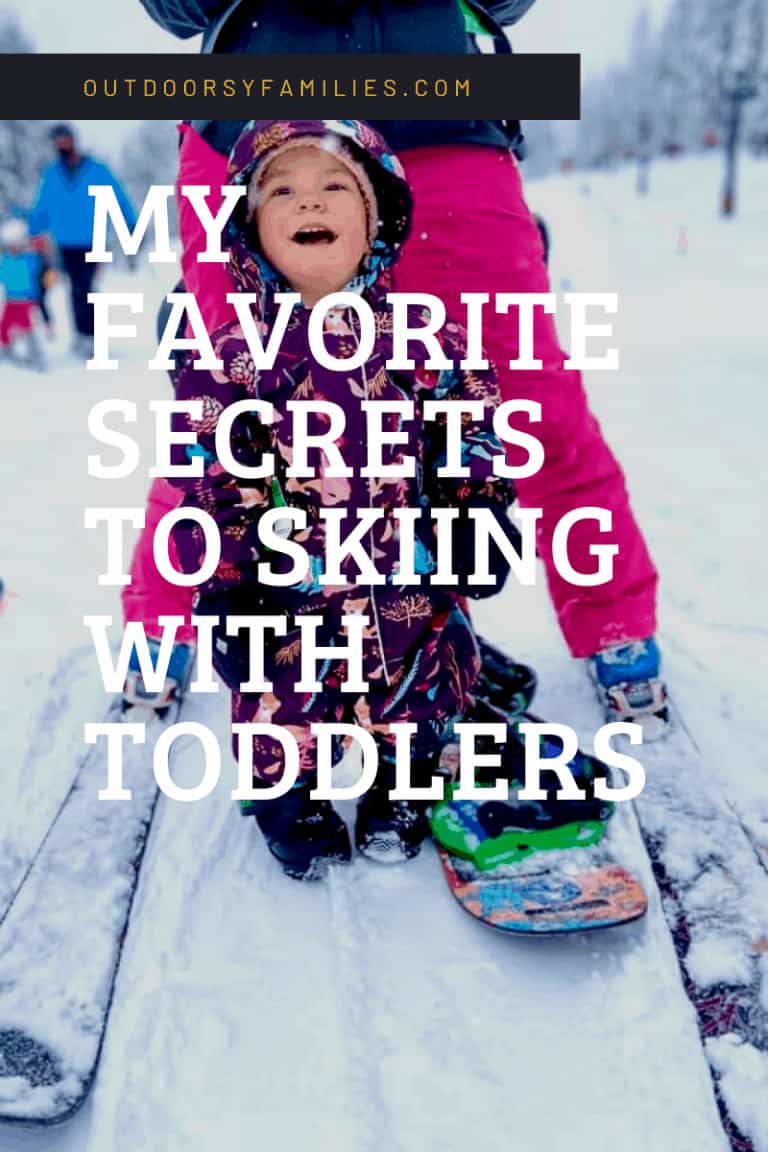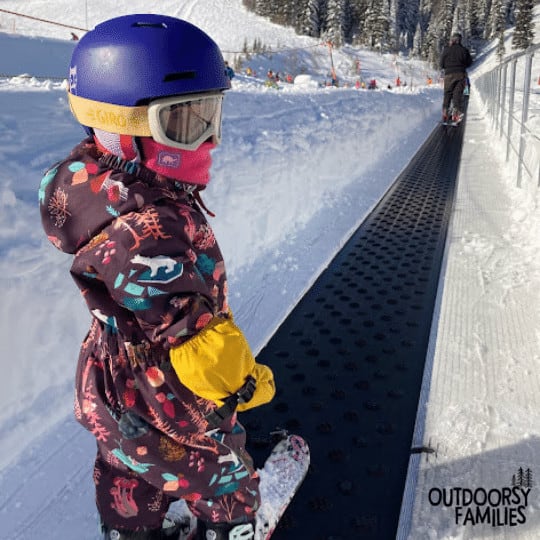Best Ski Helmets for Kids: Toddler through Teen (2024)
Choosing the correct ski helmet for your kid is one of the most essential pieces of ski gear your child will wear. Whether you have a toddler or a teen, there is the perfect helmet for your kid! Ski helmets are not a one size fits all process. Every kid’s head shape is different and each helmet is designed slightly differently. This buyer’s guide gives you all the details you need to choose the perfect ski helmet for your kid!
This post contains affiliate links, including links from Amazon. If you use these links to buy something we may earn a commission at no extra cost to you. Thanks for supporting our family!
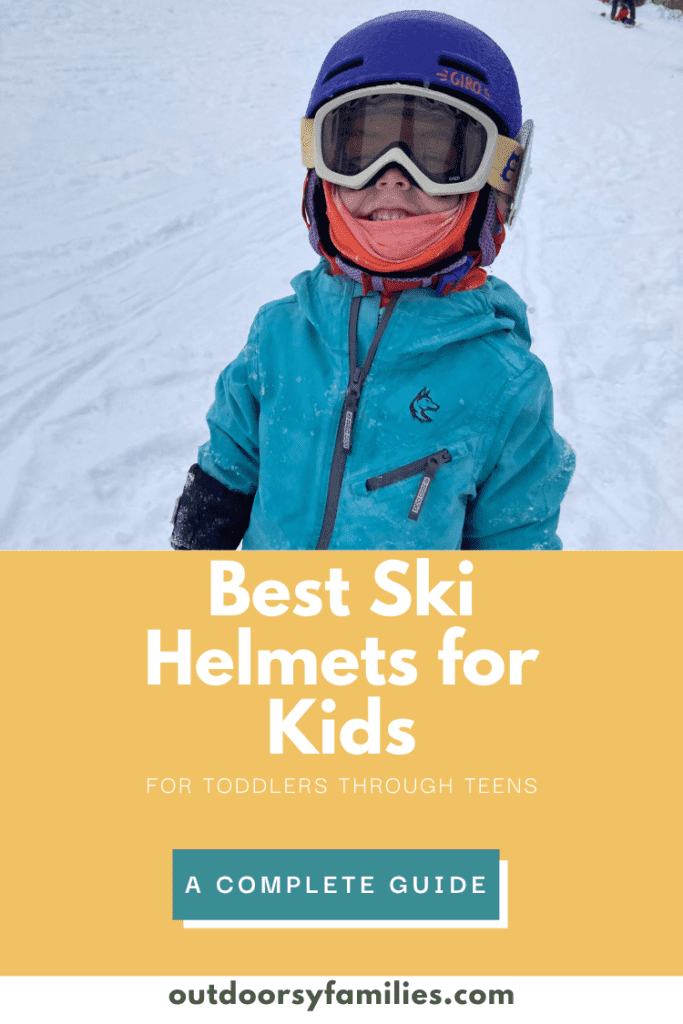
Does my kid need a ski helmet?
Many people may wonder if their child needs a ski helmet – especially if you are just starting out skiing as a family. Yes – all kids need ski helmets!
Many times people think that beginners may not need a helmet because they are not going to be skiing challenging terrain. However, in my experience beginners are much more likely to fall (and fall in crazy ways!)
However, this does not discount the importance of an experienced skier’s need for a helmet! Higher speeds and skiing through trees are reasons enough to keep a helmet on your younger skiers.
You can always rent a helmet at a ski resort if you are going on a short ski vacation or are planning on trying skiing for the first time. However, you will not know the history of that helmet and will not be familiar with any major crashes that could impact the integrity of that helmet. If you are okay with this unknown, renting makes it an easy option to see if skiing is right for you and your kids.
Quick Picks for Best Ski Helmets for Kids (Toddler through Teen)
Are you in a hurry and looking for the best ski helmet to buy now? Cut to the chase and check these options out!
Check out Ski Sizes for Kids and Best Toddler Ski Tools for more ski tips!
Pre-Buying FAQs
Below is a list of questions and answers on buying a snowsports helmet. These questions address fitting and general questions you may have for purchasing a snowsports helmet.
Can I use a bike helmet for my kid?
While it may be tempting to strap your kid’s bike helmet on and hit the magic carpet, please know that there is a difference between snowsports helmets and biking helmets.
Bike helmets are designed for biking and will not accommodate goggles or keep kids’ ears and head warm in cold weather. Bike helmets are also designed for bike-related collisions and may not protect your child from ski-related accidents.
There is one caveat to this. Some helmets are specifically designed for dual use. We have some of these hybrid helmets in this guide.
Is there a difference between ski helmets and snowboard helmets?
There is no difference between a ski helmet and a snowboarding helmet. Both are designed for snowsports and tested for snow-related impacts. Some marketing may be directed to one winter sport over the other, such as a trendy helmet that looks good while snowboarding in the park.
What should I look for in a ski helmet for my child?
When shopping for a ski helmet, look for a few specific features that will work to keep your kid safe and comfortable on the ski hill. One of these factors is a lightweight helmet. I want my toddlers to have a lightweight helmet that is also packed with safety features. Safety features that are a top priority include a reinforced abs shell, eps foam interior, and a multi-directional impact protection system (MIPS).
I also choose a ski helmet in bright colors to help me and other skiers spot my little rippers on the mountain. A helmet with an adjustable dial is also another feature I look for when shopping for a ski helmet. Lastly, I look for a simple fit system that will be warm and comfortable for my younger kids.
All the helmets in this guide feature these top priorities.
How should a snow helmet fit on my kid’s head?
When purchasing a new helmet, be sure to measure your child’s head first! I have a soft measuring tape that I use for measuring my children’s head circumferences. This gives me an idea of what helmets will best fit my kids. When measuring your child’s head, position the tape measure just above the ears and about 1” above your child’s eyebrows.
Winter sports helmets are designed to fit snugly on your child’s head, while also keeping them warm and dry while skiing. If a helmet can rock back and forth, it is too big. Try adjusting the dial on the back of the helmet or try a smaller size. The chinstrap should be snug without choking and feeling uncomfortable for your kid. This is a big struggle I have with my young children. They always think the chin strap is too tight.
Another thing you should look for is that there is not a gap larger than one inch between your kid’s forehead and eyebrows. There also shouldn’t be a gap between the goggles and the helmet. The helmet shouldn’t push down or cause your kid’s goggles to fog. The dreaded “gaper gap” has been the biggest problem in finding the best helmet for my son.
Should we try on helmets before buying them?
Trying on winter sports helmets can help find the best fit for your child. However, if you are looking to shop online just measure your child’s head and use that information to order the perfect helmet for your kid. If for some reason the helmet doesn’t fit right, return it and try again!
What should I look for when fitting helmets with goggles?
Ski helmets and goggles should fit comfortably together, with little to no gap between the fit. They should not be so close together that your child’s face feels smashed. Also, the goggles shouldn’t fog up from the helmet putting pressure on the goggles. There should not be a big gap between the goggles and the helmet either. Look for a comfortable, yet snug fit for the goggles and helmet.
Typically ski helmets and ski goggles work best when you buy the same brands together. My favorite fit for toddlers is the Giro Crue and Giro Chico.
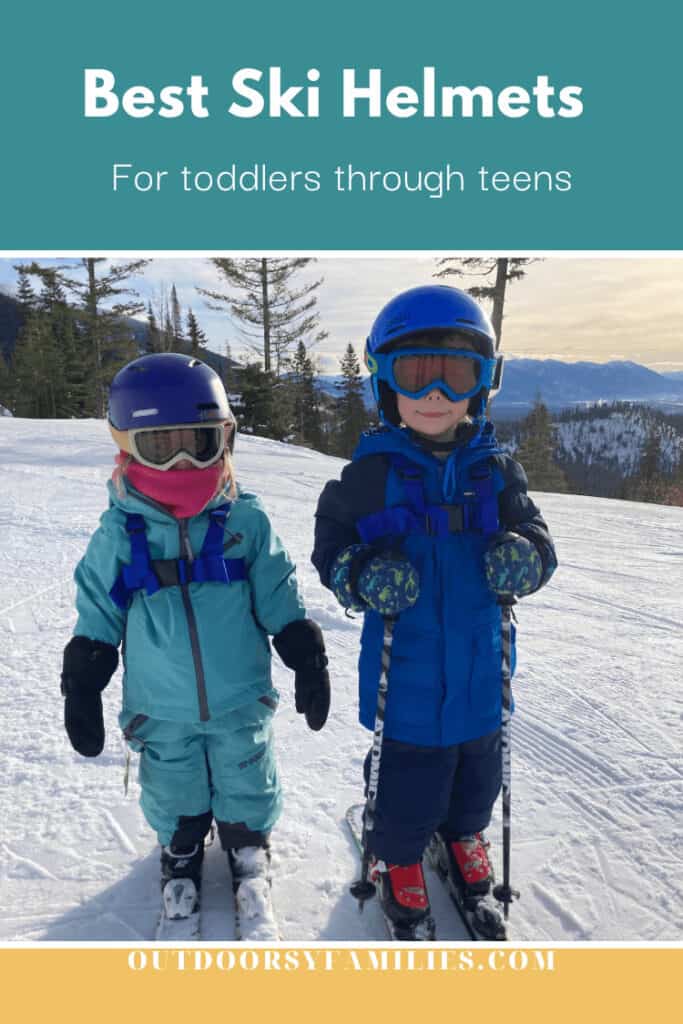
What is MIPS?
MIPS stands for Multi-Directional Impact Protection System. MIPS technology works to protect the brain in an impact at an angle. Older helmet technology protected against direct impact accidents, but this is rarely how crashes occur. Instead, ski accidents often occur at an angle, which is where MIPS comes into play. MIPS helmets include a low-friction layer within the helmet, which allows the head to slightly move upon impact. This slight movement works to absorb the impact of the crash, protecting the brain.
What is WaveCel Technology?
WaveCel technology works similarly to MIPS in that it absorbs the impact of a head accident. It works like a network of shock absorbers to connect your kid’s head to the helmet. As a result, it absorbs the impact of an accident through three mechanisms: flex, crumple, and slide. WaveCel technology can absorb up to 73% more rotational acceleration than standard helmets.
WaveCel is limited in its products at this time. I look forward to seeing it expand into the kid’s gear market. I haven’t included WaveCel helmets in this guide, since they are so limited on the market (and pricey!)
Should I buy a helmet with MIPS or WaveCell?
This is a decision that you will have to make. Personally, I have replaced all our family’s ski helmets with MIPS ski helmets. The risk associated with a serious injury was enough for me to decide to upgrade our family’s helmets.
However, there can be a significant price difference between a MIPS helmet and a helmet without MIPS technology. They are typically around $30-50 more expensive than non-MIPS helmets. I have found some MIPS helmets on great deals and like to share those with my readers. If you’re interested in getting updates on great gear deals, be sure to sign up for my email list!
If you are on a tight budget or do not plan to ski often, you will most likely be fine choosing a traditional helmet. After all, any helmet is better than no helmet!
Best MIPS Ski Helmets for Toddlers
Giro Crue MIPS

The Giro Crue MIPS helmet fits well for young skiers. Our daughter began wearing this helmet at 25 months old. She could easily hold her head up and did not get weighed down by this lightweight helmet. The interior is soft and the chinstrap features added soft padding to keep her comfortable. The low-profile hardshell construction keeps kids safe without sacrificing comfort. With an adjustable dial, this helmet easily fits young children. The air vents are not adjustable, but we have never experienced our daughter feeling too cold due to her air vents. The goggle combo with the Giro Chico makes for a perfect fit between the google and the helmet.

Best for: Toddlers through young children. Be sure to measure your child’s head first to order the right size! This is a great helmet for first-timers.
Weight: 1 lb. 1.7 oz
Pros:
- MIPS Technology
- Low-profile hardshell design
- Stack ventilation prevents goggles from fogging
- Removable ear pads for easy cleaning
- Adjustable dial to get the right fit
Cons:
- Pricey helmet for young kids
- Heavier than a lot of kid’s helmets
Smith Glide Jr MIPS

The Smith Glide Jr MIPS is a great helmet for young children or toddlers! Features an in-mold system that fuses the outer shell and the EPS foam into a lightweight and durable design. The adjustable dial makes it easy to get the best fit for your kid. Featuring an extra warm and soft interior, this helmet keeps little skiers cozy on even the coldest days. With plush ear pads, kids won’t be complaining about cold weather! Ventilation isn’t adjustable, but we haven’t had a problem with being too cold. My son has had a sweaty head a few times after using the Glide Jr. helmet though! If you are looking for a helmet and goggle combo, this is a great deal for young skiers!

Best for: Young kids and toddlers who want a lightweight helmet. It’s super lightweight, which makes it such a great helmet for toddlers.
Weight: 12 oz
Pros:
- Super lightweight, yet durable in-mold system
- Easily adjustable
- MIPS technology
Cons:
- My son has a difficult time getting his goggles over the small rim on the edge of the helmet
- We’ve struggled with a gap between the helmet and goggles while using his Giro Chico goggles. I’m going to switch to Smith with him and see if that helps!
Best Non-MIPS Ski Helmets for Toddlers
Wildhorn Spire

Recommended for ages 3-8, this is a great helmet for older toddlers and young kids. It features a polycarbonate in-mold shell and polystyrene foam liner. The adjustable dial on the back makes it easy to get the perfect fit for your little ones. For the price, it’s a great choice because it also comes with goggles!
Best for: Occasional young skiers looking for a safe helmet without MIPS technology.
Weight: I couldn’t confirm the weight of this helmet.
Pros:
- Can be purchased through Amazon with goggles!
- Made in Utah
Cons:
- For about $20 more you can get the Smith Glide MIPS with goggles, giving you MIPS technology and a super lightweight toddler helmet.
- Not sure about the weight compared to other helmets.
Giro Crue

The same style as the Giro Crue MIPS, this helmet features all the best parts of the Giro Crue without the MIPS technology. The lower price point does not feature the adjustable dial, but rather has an elastic band that can be adjusted into three positions.
Best for: Families that are looking for a lower price point helmet
Weight: 1 lb. 1.7 oz.
Pros:
- Same high-quality design as Giro Crue MIPS
Cons:
- Not nearly as adjustable as other helmets.
Giro Launch

At an even lower price point than the Giro Crue, this helmet has all the basics covered! With an adjustable dial and EPS foam liner, this helmet provides safety features and adjustability at a low price! This helmet is also super lightweight, which makes it great for very young toddlers who may struggle to hold up a heavier helmet.
Best for: Families that are looking for a lower price point helmet without sacrificing adjustability and safety.
Weight: 10.4 oz
Pros:
- Lightweight
- Adjustable dial
- EPS foam
Cons:
Smith Holt Jr

The Smith Holt Jr. is one of those helmets that can transition from winter sports to summer sports. With removable bombshell earpads and a removable goggle strap lock, the transition from snowsports to biking and skateboarding is easy. Safety features include advanced ABS construction for durability and safety. This helmet is also certified for all-season use, so it’s been tested on the slopes and off the snow.
Best for: Families looking for a multi-use helmet that transitions from winter to summer.
Weight: 1.21 lbs
Pros:
- Adjustable
- Certified for multi-use
Cons:
- Heavier than many ski helmets on the market.
Best MIPS Ski Helmets for Kids
Giro Spur MIPS

This ‘big kids” helmet is a perfect transition from the Giro Crue helmet. With in-mold construction, the polycarbonate outer shell is fused with the EPS foam for a lighter and cooler helmet than traditional helmets. The in-form tuning system not only allows for adjusting the helmet with an adjustable dial but also allows for vertical tuning. Add in MIPS technology, and this is a solid kids’ helmet!
Best for: Older kids who are needing a ski helmet filled with safety features without the sticker shock.
Weight: 12.7 ounces
Pros:
- MIPS technology
- Durable material
- Warm insulation
Cons:
- Small vents may cause some kids to feel hot on warm ski days
Pret Moxie X MIPS
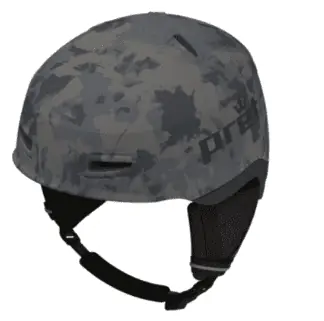
The Pret Moxie X MIPS helmet features in-mold construction and advanced composite tech. Advanced composite technology is a Pret feature that reinforces the helmet with interior polycarbonate plates, creating a “halo” of double shell safety features. It also features wool ear pads if you are interested in natural fibers for your child. The ear pads as easily removable for warm days and the helmet is audio-ready! It includes an adjustable dial to get the right fit for your child. Air vents are always open, keeping your kid cool and comfortable.
Best for: older kids who are skiing hard and need durable, yet lightweight kid’s ski helmet.
Weight: 13 ounces
Pros:
- Provides additional safety features without sacrificing weight
- Natural fibers
- Audio ready
- Removable ear pads
Cons:
- More expensive than other helmets on this list.
Smith Prospect MIPS

This kids’ helmet truly features the same amazing features as Smith’s adult line, but in a smaller size. Smith’s Koroyd foam allows for airflow without sacrificing safety standards. Featuring 14 adjustable vents and removable ear pads, the Prospect allows kids to make adjustments to their comfort level while skiing. With a Grow With Me system, the interior can be adjusted to grow with your child, allowing this helmet to last longer than others.
Best for: Kids needing an ultra-adjustable helmet with adult quality
Weight: 1 lb.
Pros:
- Adjustable vents
- Lightweight, honeycomb foam allows for more airflow while keeping high safety standards
Cons:
- Higher cost, but comes with more features
Best Non-MIPS Ski Helmets for Kids
Giro Launch

At an even lower price point than the Giro Crue, the Giro Launch has all the basics covered! With an adjustable dial and EPS foam liner, this helmet provides safety features and adjustability at a low price! This helmet is also super lightweight, which makes it great for very young toddlers who may struggle to hold up a heavier helmet.
Best for: Families that are looking for a lower price point helmet without sacrificing adjustability and safety.
Weight: 10.4 oz
Pros:
- Lightweight
- Adjustable dial
- EPS foam
Cons:
- No MIPS technology, but still safe
Smith Holt Jr

The Smith Holt Jr. is one of those helmets that can transition from winter sports to summer sports. With removable bombshell earpads and a removable goggle strap lock, the transition from snowsports to biking and skateboarding is easy. Safety features include advanced ABS construction for durability and safety. This helmet is also certified for all-season use, so it’s been tested on the slopes and off the snow.
Best for: Families looking for a multi-use helmet that transitions from winter to summer.
Weight: 1.21 lbs
Pros:
- Adjustable
- Certified for multi-use
Cons:
- Heavier than many ski helmets on the market.
Wildhorn Spire

Recommended for ages 3-8, this is a great helmet for older toddlers and young kids. It features a polycarbonate in-mold shell and polystyrene foam liner. The adjustable dial on the back makes it easy to get the perfect fit for your little ones. For the price, it’s a great choice because it also comes with goggles!
Best for: Occasional young skiers looking for a safe helmet without MIPS technology.
Weight: I couldn’t confirm the weight of this helmet.
Pros:
- Can be purchased through Amazon with goggles!
- Made in Utah
Cons:
- For about $20 more you can get the Smith Glide MIPS with goggles, giving you MIPS technology and a super lightweight helmet.
- Not sure about the weight compared to other helmets.
Best MIPS Ski Helmets for Teens
Bern Bandito MIPS

The stylish Bern Bandito MIPS helmet combines the park-style helmet Bern is known for, with MIPS technology for a great price. With a thin ABS shell and EPS foam, this helmet is a durable, yet lightweight option for kids. It also can be converted in the summer to a bike helmet or skateboard helmet. Featuring 10 vents, this helmet can convert to summer weather without being too hot for your kid.
Best for: Teens who are looking for a stylish winter helmet that converts to a summer helmet.
Weight: 1 lb 2 oz
Pros:
- Convertible
- Half shell style
Cons:
- Despite claiming to be lightweight, it’s heavier than many helmets
Giro Ledge MIPS

This adult-size helmet features the same great design as the Giro Crue, but in a larger size. Built with hardshell construction, the Giro Ledge features an outer shell fused with EPS foam. Super Cool vent system pulls in fresh air, while pushing out heat, keeping teens cool and comfortable while skiing. This helmet does not feature an adjustable dial but instead adjusts through an elastic strap on the back of the helmet. I’d prefer to see an adjustable dial, but this MIPS helmet is priced between $80-100.
Best for: Teens who can fit in an adult-size helmet and are looking for a low-price helmet with MIPS technology. (Be sure to measure your teen’s head first before ordering!)
Weight: 1.1 lbs.
Pros:
- Minimalist, simple design
- Low-cost MIPS technology
Cons:
- Not as adjustable as other helmets
Best Non-MIPS Ski Helmets for Teens
Atomic Four Helmet
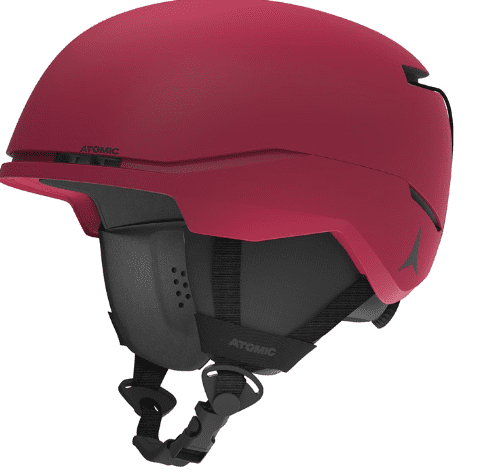
The Atomic Four helmet features ABS hard shell construction with a HOLO core. This inner construction acts like an egg carton as it absorbs impact. A 360-degree tuning allows kids to tune the helmet not just for size, but also for head shape. Featuring audio-compatible ear pads, this helmet is ready to bring tunes to the mountain.
Best for: families looking for a non-MIPS helmet that is packed with safety features and adjustability.
Weight: Couldn’t find
Pros:
- ABS Construction
- Very adjustable
- Audio compatible
- Affordable
Cons:
- Unknown weight to compare to other helmets
Anon Burner Helmet

Anyone riding with Burton boots will be familiar with the BOA fit system. The Anon Burner takes that same great system and applies it to helmets. This stylish helmet is also simple fit ready, meaning teens can adjust the fit to accommodate a beanie instead of using the ear pads and insulation. This creates a low-profile skateboard-influenced helmet. Teens can also run their goggles under the helmet for a custom look.
Best for: Teens who like to look good while skiing or snowboarding in the park.
Weight: 12.9 ounces
Pros:
- Custom-fit and design
- Stylish
- Lightweight
Cons:
- It can be found on sale, but if not on sale it’s pricey for a helmet without MIPS technology.
Ski Helmets FAQs
How long do ski helmets last?
Like any safety product, ski helmets should be replaced after a serious accident. Even if they’re brand new! If they are in good condition, replace the helmet after about 5 years due to weakening safety features. With kids, a good rule of thumb is to measure their heads before each ski season to ensure that their gear will still fit comfortably and safely.
Can I purchase a used ski helmet for my child?
NEVER purchase a used ski helmet. You do not know the helmet’s history and what accidents it was involved in.
How do I know when my kid has outgrown their helmet?
If the ski helmet is beginning to feel tight or if the helmet no longer rests comfortably on your child’s head then it might be time for a new helmet. Measure your kid’s head with a soft tape measure. You should position the tape measure just above the ears and about 1” above your child’s eyebrows.
Can kids wear an adult helmet?
Kids and teens can wear adult ski helmets IF it is the correct fit. Be sure to look at size charts and have your child’s head size before ordering any helmet.
Ski Helmets for Kids
I hope you found what you’re looking for and know what helmet will work best for your kids. If you found this information helpful, join my mailing list for more ski day tips and tricks!
Other Kid’s Skiing Resources
Are you looking for more tips and tricks for skiing with kids? Be sure to read these articles for your best ski season yet!

Reima Snowsuit Gear Review for Kids and Toddlers
We’ve been using Reima gear for years now. Honestly, they’ve got some of my favorite outdoor products for my kids, like affordable yet durable rain mittens, snow boots that are warm, functional, and easy to put on, and some of the most waterproof, durable mittens we own. But one place Reima stands out from the…
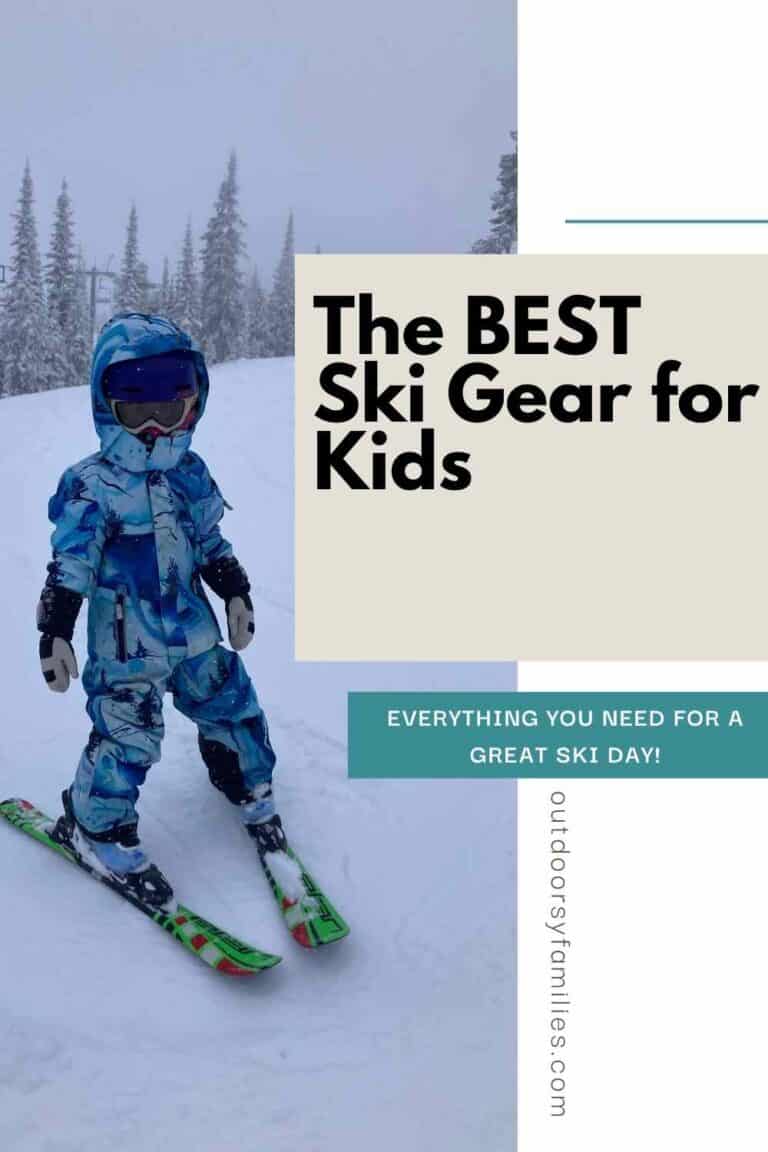
The Ultimate Guide to Kids Ski and Snowboard Gear (2024)
This post contains affiliate links, including links from Amazon. If you use these links to buy something, we may earn a small commission at no extra cost to you. Thanks for supporting our family! The Importance of Good Ski Gear for Kids Skiing with kids is all about creating lifelong memories while getting outside, even…
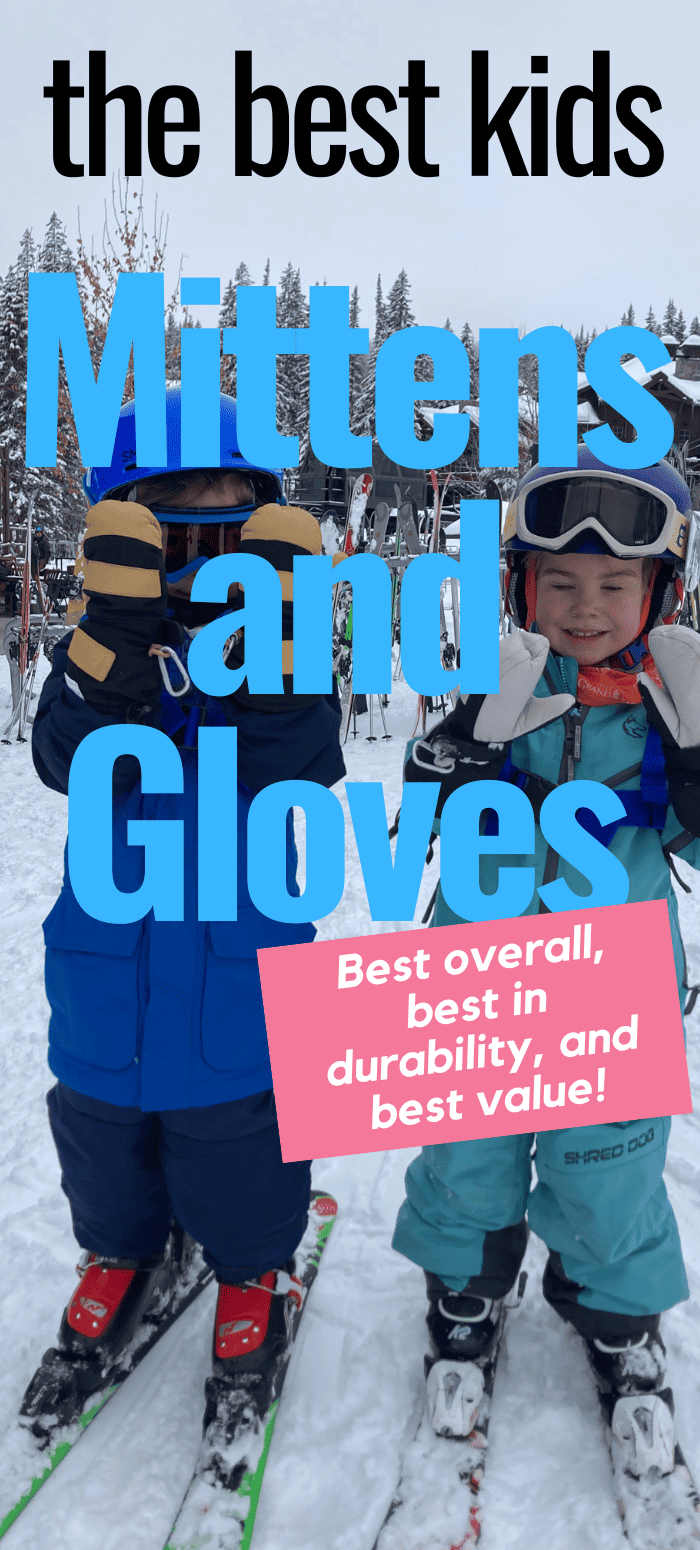
Best Winter Mittens and Gloves for Kids and Toddlers (2024)
Choosing a pair of winter mittens or gloves for your kids doesn’t need to be a struggle, but often it’s more complicated than it seems. The mittens are too short and snow sneaks between a crack, or they’re not nearly as waterproof as you thought are soaking wet within 15 minutes of playtime. The worst…
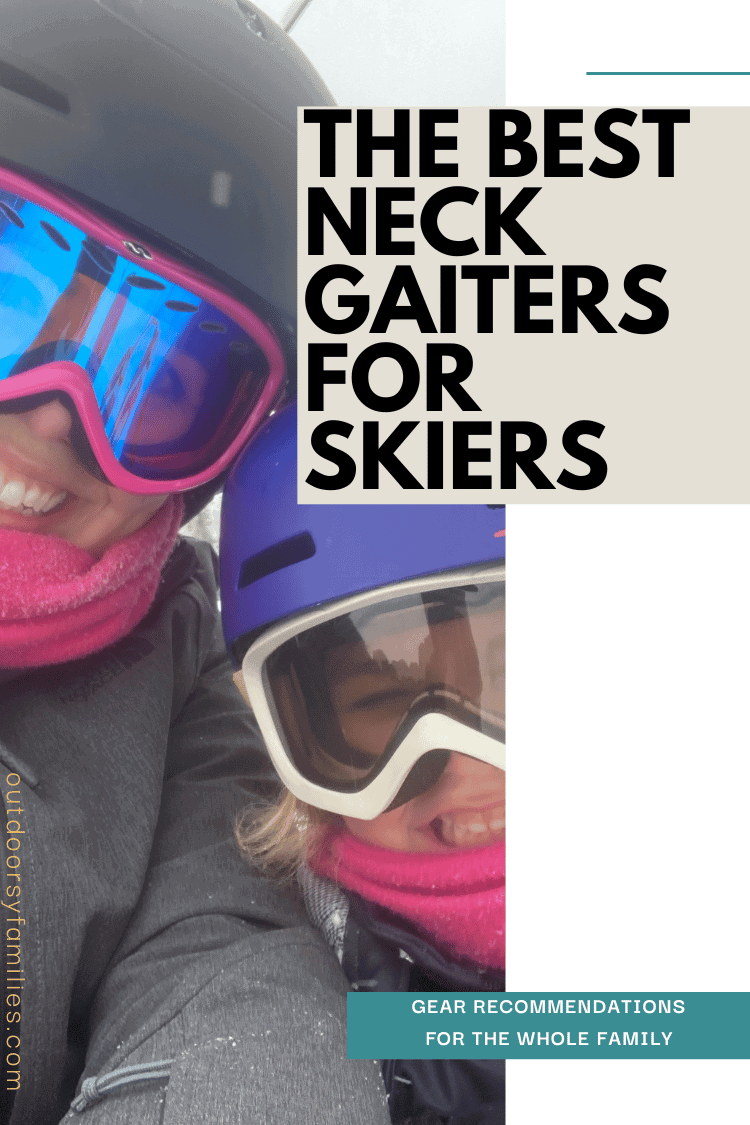
18 Best Neck Gaiters for Skiing and Snowboarding (2024)
Staying warm on a cold ski day is essential to keep the whole family happy. We know the importance of quality ski helmets and outer gear. But, sometimes we can forget about a critical part of exposed skin. Our faces and necks! This guide shares the best neck gaiters and balaclavas for your whole family. From adults…
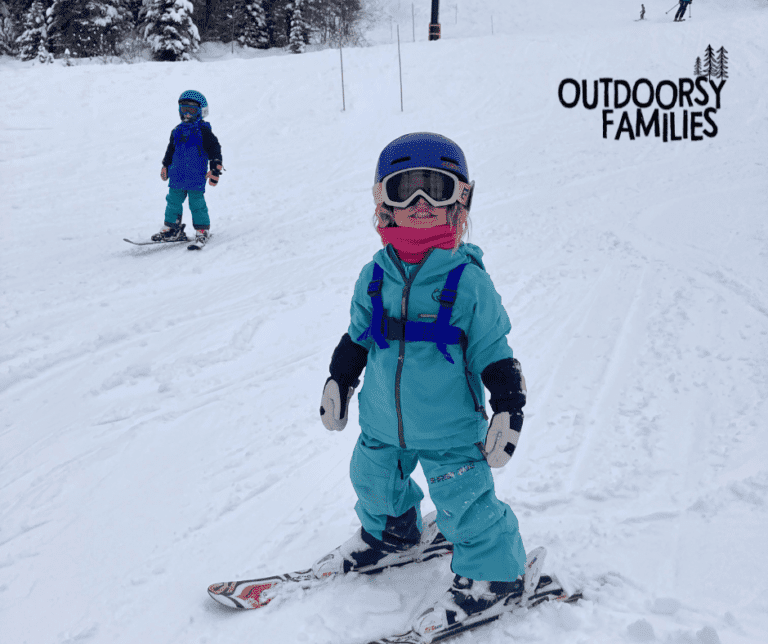
Shred Dog Gear Review: Kid’s Ski Gear (Now Akova!)
This post contains affiliate links, including links from Amazon. If you use these links to buy something we may earn a commission at no extra cost to you. Thanks for supporting our family! Choosing the correct winter gear for kids can have a significant impact on how your ski day is going to go. Kids…
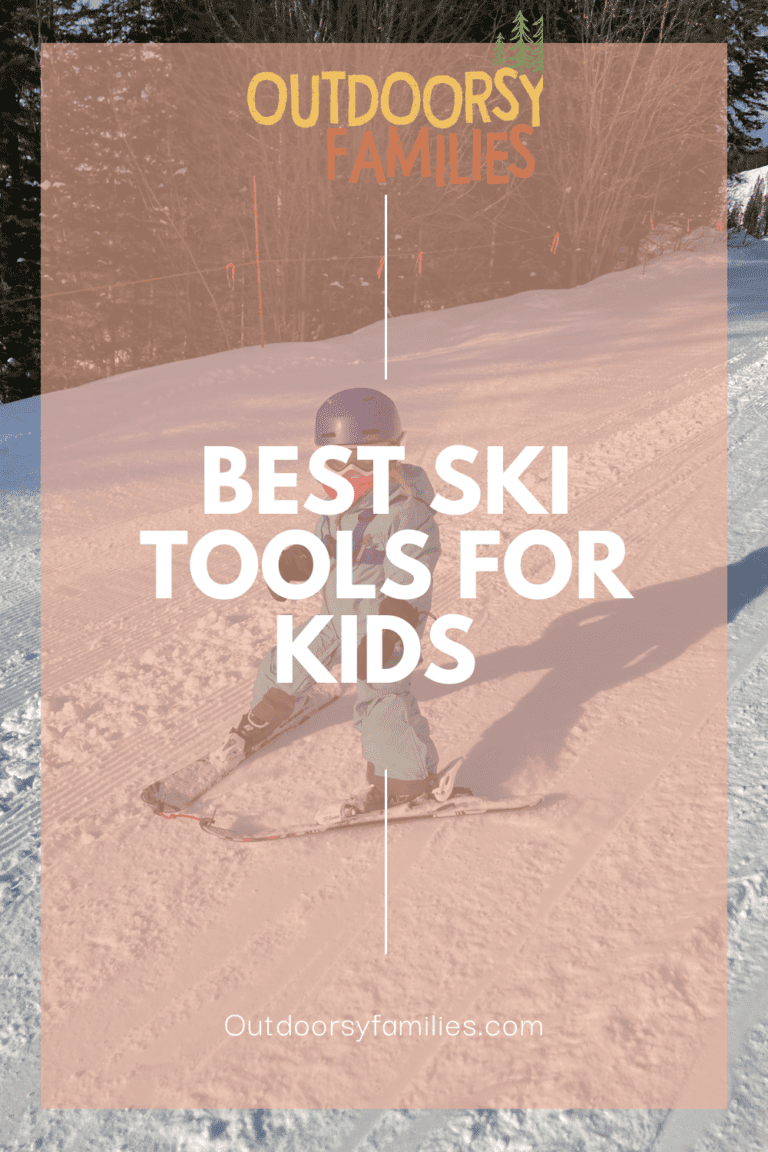
Best Ski Harness and Ski Tools for Toddlers (2023)
If you are skiing with a young child or toddler you will be tempted to purchase a ski harness to help your toddler learn to ski. Especially when you are skiing with young kids for the first time, it may make sense to use a tool to keep your little ones close by. I wish…
